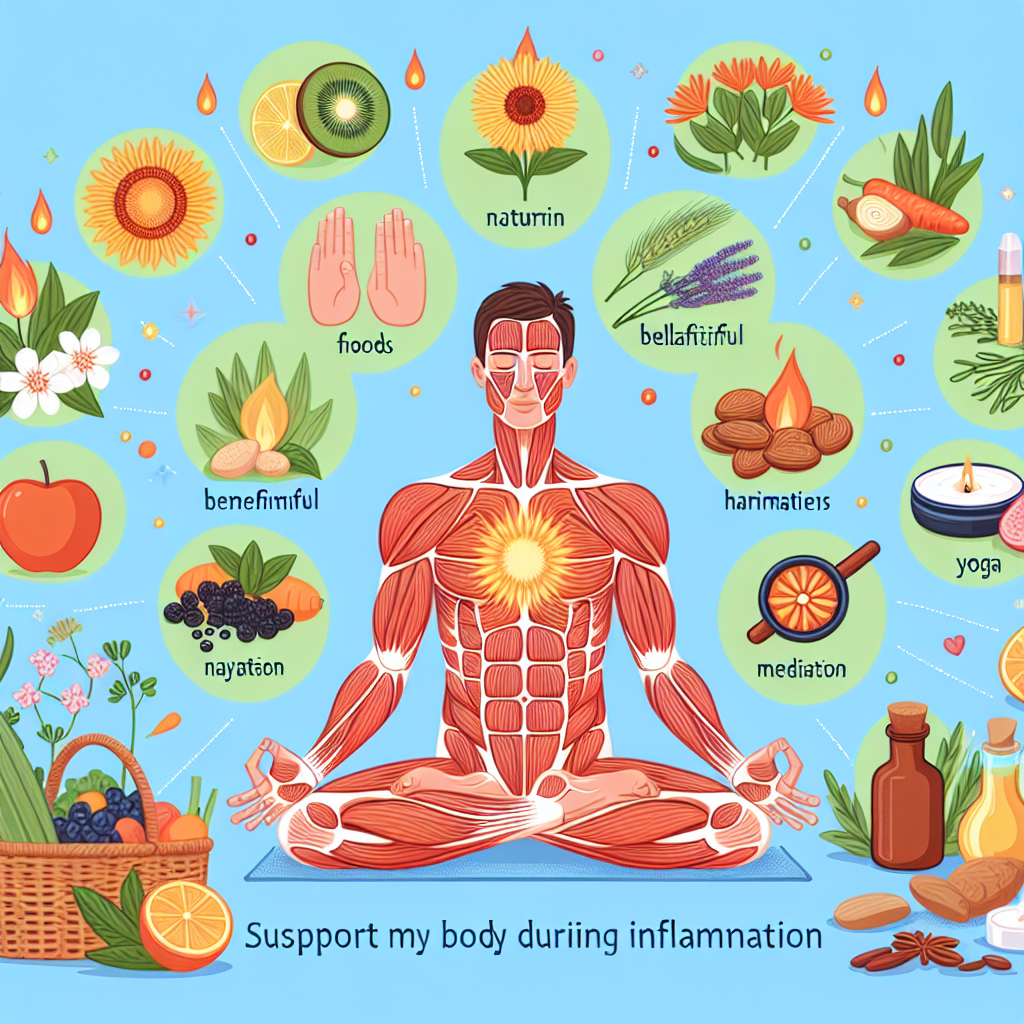How to Support Your Body Naturally During Inflammation

Discover how to support your body naturally during inflammation. Learn more about the best practices, foods, and lifestyle changes that can help manage inflammation. Don’t let inflammation control your life. Take the first step towards a healthier you. Click here to start your journey towards vibrant vitality.
Effective Natural Remedies to Alleviate Inflammation
Inflammation is a natural response of the body to injury or illness. It is a protective mechanism that helps the body heal by increasing blood flow to the affected area, delivering necessary nutrients and immune cells. However, when inflammation becomes chronic, it can lead to various health problems such as heart disease, diabetes, and arthritis. Therefore, it is crucial to support your body naturally during inflammation to promote healing and prevent chronic inflammation.
One of the most effective natural remedies to alleviate inflammation is to maintain a healthy diet. Consuming anti-inflammatory foods can significantly reduce inflammation in the body. Foods rich in omega-3 fatty acids, such as fatty fish, walnuts, and flaxseeds, are known for their anti-inflammatory properties. Similarly, fruits and vegetables, particularly those rich in antioxidants like berries, oranges, and leafy greens, can help combat inflammation. On the other hand, it is advisable to avoid foods that can trigger inflammation, such as processed foods, sugary drinks, and fried foods.
In addition to a healthy diet, regular exercise can also help reduce inflammation. Physical activity promotes better circulation, which can help flush out inflammatory chemicals from the body. It also helps to maintain a healthy weight, which is crucial as obesity is a significant risk factor for chronic inflammation. It doesn’t have to be strenuous exercise; even moderate activities like walking, cycling, or yoga can have significant anti-inflammatory effects.
Another natural remedy to support your body during inflammation is to ensure adequate sleep. Sleep is a time when the body repairs and regenerates itself, and lack of sleep can exacerbate inflammation. Therefore, it is essential to prioritize good sleep hygiene, which includes maintaining a regular sleep schedule, creating a restful sleep environment, and avoiding stimulants like caffeine and electronics close to bedtime.
Herbal remedies can also be beneficial in managing inflammation. For instance, turmeric, a spice commonly used in Asian cooking, contains a compound called curcumin, which has potent anti-inflammatory properties. Similarly, ginger and green tea are also known for their anti-inflammatory effects. However, it is important to consult with a healthcare provider before starting any herbal remedies, especially if you are taking other medications or have underlying health conditions.
Stress management is another crucial aspect of supporting your body during inflammation. Chronic stress can trigger inflammation, so it’s important to incorporate stress-reducing activities into your daily routine. This could include mindfulness practices like meditation or deep breathing exercises, engaging in hobbies or activities you enjoy, or seeking support from a mental health professional if needed.
Lastly, hydration plays a vital role in managing inflammation. Water helps flush toxins out of the body and ensures that all bodily functions, including the immune system, function optimally. Therefore, it is important to stay well-hydrated, especially during periods of inflammation.
In conclusion, supporting your body naturally during inflammation involves a holistic approach that includes a healthy diet, regular exercise, adequate sleep, herbal remedies, stress management, and proper hydration. By incorporating these strategies into your lifestyle, you can help your body heal more effectively and prevent chronic inflammation. However, it is important to remember that while these natural remedies can support your body during inflammation, they are not a substitute for medical treatment. Always consult with a healthcare provider for any persistent or severe inflammation.
Understanding and Managing Inflammation through Diet and Lifestyle

Inflammation is a natural response of the body to injury or infection, acting as a protective measure to eliminate harmful stimuli and initiate the healing process. However, when inflammation becomes chronic, it can lead to various health issues such as heart disease, diabetes, and arthritis. Therefore, it is crucial to understand how to support your body naturally during inflammation through diet and lifestyle changes.
The food we consume plays a significant role in managing inflammation. A diet rich in anti-inflammatory foods can help reduce inflammation and promote overall health. Fruits and vegetables, particularly those rich in antioxidants like berries, oranges, and leafy greens, are excellent choices. These foods are high in natural compounds that can reduce inflammation and protect your cells from damage.
Similarly, fatty fish like salmon, mackerel, and sardines are rich in omega-3 fatty acids, known for their potent anti-inflammatory properties. Nuts and seeds, such as almonds and flaxseeds, also contain healthy fats that can help combat inflammation. On the other hand, it is advisable to limit the intake of processed foods, refined sugars, and unhealthy fats, as these can trigger inflammatory responses.
In addition to a healthy diet, certain lifestyle changes can also support your body during inflammation. Regular physical activity is one such change. Exercise has been shown to reduce inflammation by decreasing inflammatory markers in the body. It doesn’t have to be strenuous; even moderate activities like walking, cycling, or swimming can have significant benefits.
Getting enough sleep is another crucial aspect of managing inflammation. During sleep, your body works to heal and restore itself, including reducing inflammation. Lack of sleep can disrupt this process, leading to increased inflammation and other health problems. Therefore, ensuring you get a good night’s sleep is essential for maintaining a healthy inflammatory response.
Stress management is also a key factor in controlling inflammation. Chronic stress can trigger an inflammatory response and exacerbate existing inflammation. Therefore, incorporating stress-reducing activities into your daily routine can be beneficial. This could include practices like yoga, meditation, deep breathing exercises, or any other activity that helps you relax and unwind.
Lastly, staying hydrated is vital. Water helps flush toxins out of the body, which can reduce inflammation. Aim to drink at least eight glasses of water a day, and consider adding anti-inflammatory drinks like green tea or turmeric tea to your diet.
In conclusion, supporting your body naturally during inflammation involves a combination of a balanced diet, regular physical activity, adequate sleep, stress management, and proper hydration. By making these changes, you can help your body manage inflammation more effectively and promote overall health. Remember, it’s always advisable to consult with a healthcare professional before making significant changes to your diet or lifestyle, especially if you have a pre-existing health condition.
Holistic Approaches to Support Your Body During Inflammation
Inflammation is a natural response of the body to injury or illness. It is a protective mechanism that helps the body heal by increasing blood flow to the affected area, bringing in nutrients and immune cells to fight off any potential threats. However, when inflammation becomes chronic, it can lead to various health problems, including heart disease, diabetes, and cancer. Therefore, it is crucial to support your body naturally during inflammation. This article will explore holistic approaches to achieve this goal.
Firstly, a balanced diet plays a pivotal role in managing inflammation. Consuming a diet rich in anti-inflammatory foods can help reduce inflammation and support overall health. Foods such as fatty fish, berries, broccoli, avocados, green tea, peppers, mushrooms, grapes, turmeric, and extra virgin olive oil are known for their anti-inflammatory properties. These foods are packed with antioxidants and polyphenols, which help combat inflammation. Conversely, it is advisable to limit the intake of processed foods, sugary drinks, and red meat, as they can exacerbate inflammation.
Secondly, regular physical activity is another effective way to support your body during inflammation. Exercise has been shown to reduce inflammation by decreasing inflammatory markers in the body. It also helps improve circulation, which can aid in the delivery of nutrients and the removal of waste products from the body. Aim for at least 30 minutes of moderate-intensity exercise most days of the week. This could include activities such as brisk walking, cycling, swimming, or yoga.
Thirdly, adequate sleep is essential for managing inflammation. During sleep, the body works to repair and regenerate cells, including those involved in the inflammatory response. Lack of sleep can disrupt this process and may lead to increased inflammation. Therefore, it is important to prioritize good sleep hygiene, which includes maintaining a consistent sleep schedule, creating a restful sleep environment, and avoiding caffeine and electronic devices close to bedtime.
Moreover, stress management is a crucial aspect of supporting your body during inflammation. Chronic stress can trigger an inflammatory response in the body, leading to increased inflammation. Techniques such as mindfulness, meditation, deep breathing, and yoga can help manage stress levels and reduce inflammation.
Lastly, certain natural supplements can also support your body during inflammation. For instance, omega-3 fatty acids, found in fish oil, have potent anti-inflammatory effects. Curcumin, the active ingredient in turmeric, is another powerful anti-inflammatory compound. However, it is important to consult with a healthcare provider before starting any new supplement regimen, as some supplements can interact with medications or have side effects.
In conclusion, supporting your body naturally during inflammation involves a holistic approach that includes a balanced diet, regular physical activity, adequate sleep, stress management, and potentially the use of natural supplements. By adopting these strategies, you can help your body manage inflammation more effectively, promoting overall health and well-being. Remember, it’s not about quick fixes but about making long-term lifestyle changes that support your body’s natural healing processes.